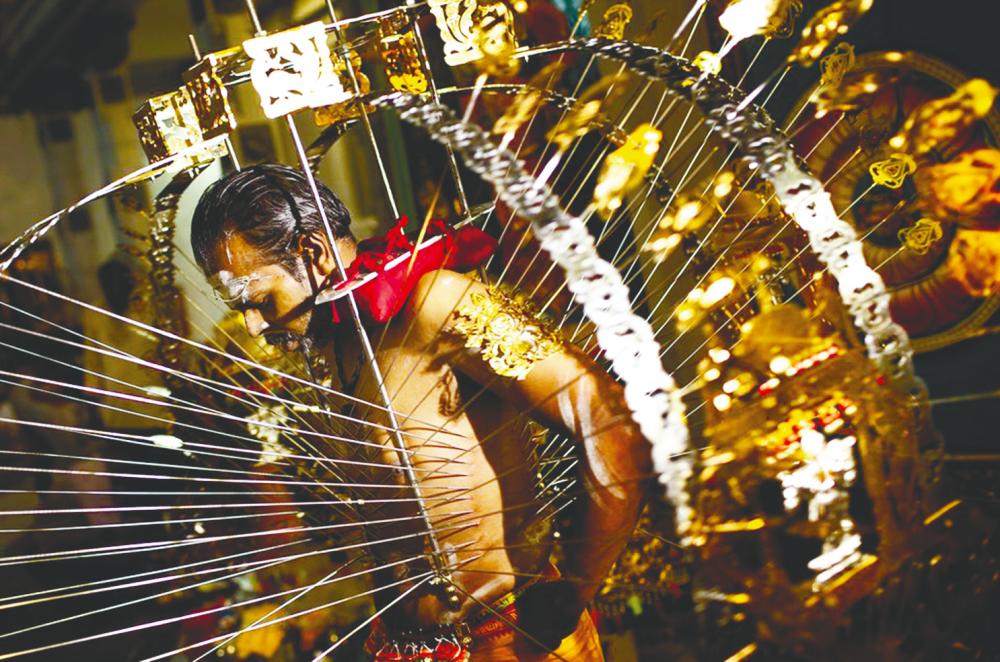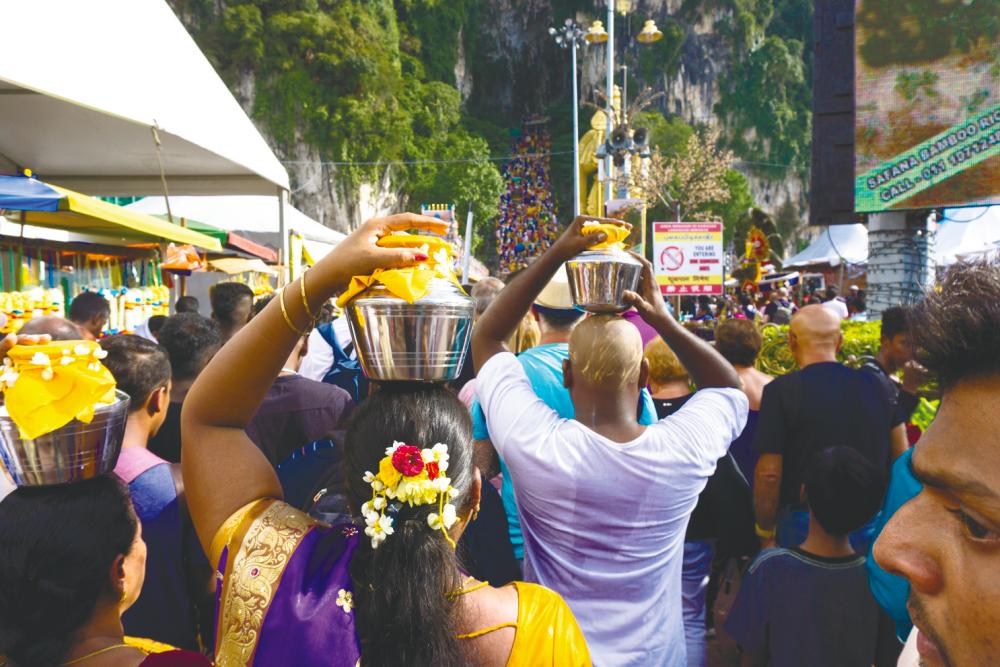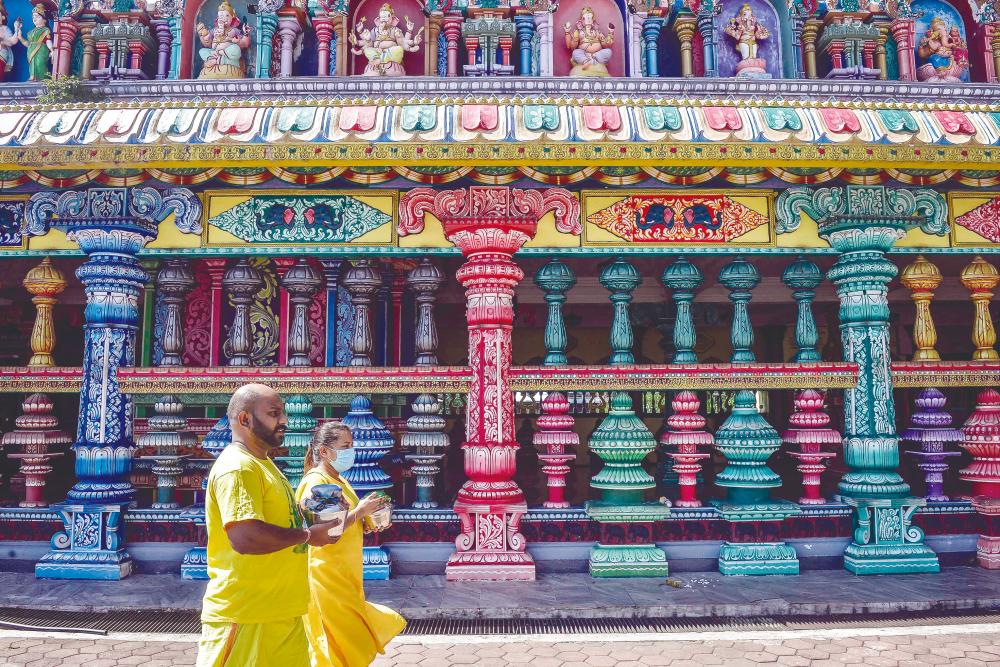OVER a million Hindus gather at various temples across the country each year to celebrate Thaipusam. The name Thaipusam comes from Tamil, Thai meaning the tenth month in the Tamil calendar, and Pusam being the name of a star in the Cancer constellation. During the festival, the stars are said to shine the brightest. Legend has it that the god Shiva (his father) sent Murugan to help his devotees who were suffering from demons’ torture. He appeared in front of the devotees on a silver chariot with a golden spear. That is why Lord Murugan is known as the Hindu god of war and symbolises bravery, virtue, youth and power. Devotees seek blessings, fulfill vows and show their devotion and gratitude to this revered deity during the festival.
The Thaipusam festivities actually take place over three days.For believers, event preparations last a matter of weeks, both spiritually and physically. Devotees prepare themselves for the occasion by cleansing their bodies through fasting and abstinence. Usually they observe a vegetarian diet for a certain period of time, depending on their vows. It is important to be completely clean and devoted to be able to carry out their sacred missions without pain and suffering. Most of you are probably aware that devotees tend to wear yellow during Thaipusam. It is because yellow is Lord Murugan’s favourite colour, which is why the statue of Lord Murugan in Batu Caves is in yellow. Yellow is also associated with new beginnings, peace and happiness.

Of course, the Kavadi is the highlight of any Thaipusam procession. The word literally means “sacrifice at every step” in Tamil.
The intricate decorative structure weighs up to 40kg and can reach up to 4m high, and is made of a steel or wooden frame and decorated with flowers or peacock feathers.The kavadis are carried by the devotees throughout the length of the procession and rested on the shoulder or hip of the carrier. This offering requires a lot of willpower and dedication.
As the saying goes, not everyone can bring a Kavadi to Lord Murugan, only the ones who are destined for this will be able to do it. The Kavadi is considered the most auspicious and painstaking offering to Lord Murugan, more than any other offering. The bearer of the Kavadi not only carries a gift to the gods, but also considers the entire Kavadi as a shrine for god himself.
Body piercings are another enthusiastic offering offered by devotees in gratitude for their answered prayers. Devotees will pierce various parts of the body, such as their cheeks, and sometimes to hang items like bells. In some cases, hooks are attached to the devotee’s back to allow them to pull the Kavadi. Most of the devotees fall into a state of trance during the piercing. This is due to the intense drumming and chanting of Lord Murugan. However, none of the believers or volunteers who do this would be seen to betired or in pain. These intense sacrifices are made not just to please Lord Murugan or to seek an answer their prayers, but to also show the world that these sharp spears do nothing when their tongue says the words: “Vel Vel Muruga, Vetri Vel Muruga.”

Milk offerings (Paal Kudam) are another popular offering during Thaipusam. Paal Kudam means carrying Paal (milk) in a kudam (pot-shaped bowl), which is usually carried on their head to be offered to Lord Murugan. The milk offered by the devotees will then be used by the priests to perform prayers. Have you ever wondered why do devotees smash coconuts during Thaipusam? This is because the coconut is believed to be an auspicious and sacred fruit that can be given to God as one of the purest forms of offering. The reason why coconuts are broken is because the act symbolises the breaking of our ego to reveal our inner purity.
The procession process will be a spectacular event during Thaipusam, and music plays an important role during the celebration. Groups of people playing urumi melam (traditional drums) walk along the route to encourage and boost the spirit of devotees as they walk to complete their journey. Family and friends of the Kavadi bearers also play a big role in supporting them, by singing religious songs known as bhajans to encourage them. Volunteers are prepared with buckets of water at every check-point to help pour water onto the feet of Kavadi bearers to help relieve them as they are walking barefoot on the hot road, and to provide food and water to rest of the community walking along with them. Thaipusam celebrations in Batu Caves, Malaysia are one of the largest of its kind in the world, attracting over a million devotees and thousands of visitors each year.
However, due to the pandemic, most of the main Thaipusam activities are cancelled this year, but there is flexibility for one or two events with strict adherence to SOPs.














